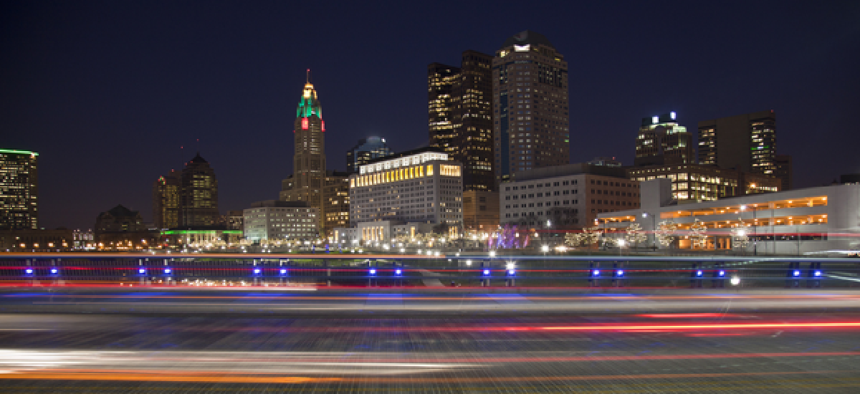Columbus lays groundwork for connected transportation data exchange

The Smart Columbus Operating System will share near-real-time data on traffic throughout the city.
Columbus, Ohio, is in the process of building the platform that will act as the brain of the city’s connected transportation system.
The platform is being called the Smart Columbus Operating System, and Jordan Davis, the director of Smart Columbus, spoke about it at Smart Cities Week in Washington D.C.
The operating system will share near-real-time data on traffic throughout the city, Davis said. It will collect information from cars that are equipped to transmit it and share metrics like time, speed and location with road-side units. These RSUs will then feed data into the system to provide a regional look at traffic.
The infrastructure to make this a reality, the RSUs, haven’t been installed yet. The city plans to put out solicitations for these devices next year, Davis said.
The city also plans to place dedicated short-range communication systems in 3,000 citizen volunteer vehicles to collect data. These systems will also be placed in school buses, public transit buses and other government fleet vehicles, Davis said.
The data from these vehicles will not only provide opportunities for traffic management, but it can also help the private industry.
“If we can make this data dynamic enough, real time enough that people can make new businesses out of it or we’re creating new jobs, that’s the opportunity,” she said.
Scott Corwin, the managing director in the strategy and business transformation practice at Deloitte, which is helping to plan the operating system, said the data will be used to help with planning in a mobility environment that is quickly changing thanks to the adoption of ride hailing apps and the promise of autonomous cars.
“Someone has to be the choreographer of supply and demand and deal with the peaks and the valleys,” he told the crowd at Smart Cities week.
The system is in the very early stages, Davis told GCN. A minimum viable product has shown that the data transfer is possible. Deloitte plans to release a document next week with more details on the system.
A system like this can be used as leverage to gain access to data from companies like Uber and Lyft, creating a “community of sharing,” Davis said. If a company shares its data, the city will share its platform, but no details on how an agreement like that could work have been finalized.
Columbus is funding these efforts in part with the $50 million it was awarded as the winner of the Department of Transportation Smart City Challenge. Seventy-eight cities applied for the funding, and 45 of them proposed an integrated data exchange like this, including many of the seven finalists.
As cars begin to roll off the assembly line with connected capabilities and as cities plan to put up more RSUs, it is obvious that a platform like this is necessary. Companies like Accenture and Microsoft are already trying to position themselves to deliver that platform.
“It’s truly the heartbeat of everything that will make us smart in this sector,” Davis said of the operating system, “and it’s the top priority of our program.”





